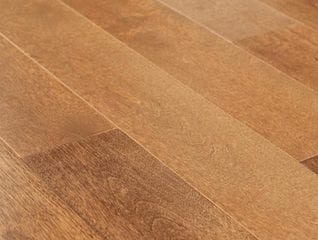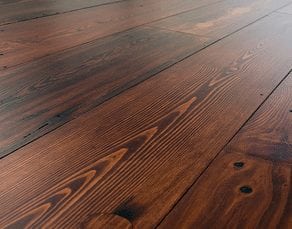Solid Hardwood vs. Engineered Hardwood – The Pros and Cons
- July 9, 2015
- By Cody Battershill
What Should You Choose... Solid or Engineered Hardwood?
If you are in the market for a new home or condo, you’ve probably noticed many developers list off floors as either solid hardwood or engineered hardwood with the latter becoming much more popular as of late.
So what exactly is the difference between solid hardwood and engineered hardwood anyway? Here’s what you should know about both types of flooring the next time you are browsing real estate.
Solid Hardwood
Solid hardwood floors are exactly that – about a ¾ inch thick solid piece of hardwood made from a single piece of wood. Because of its thickness it can be refinished again and again as long as it is in the house.
The downside to solid hardwood is that it expands and shrinks depending on humidity levels in your home. When there is more moisture in the air, like in spring and summer for example, solid hardwood will expand, while during the winter it will shrink because it’s typically drier.
It’s important that whoever installs your solid hardwood floors has the credentials and experience to do so in a way that leaves enough space for expansion and contraction. Having too much space can lead to loose hardwood in the winter, while having too little space could lead to your floor buckling in the spring or summer.
Engineered Hardwood
Surprisingly, the name “engineered” hardwood isn’t just some flashy name used to get you to buy the product.
Engineered hardwood is made of multiple layers of wood (typically plywood or HDF), bonded together with strong adhesives under high heat and pressure. Because of its “engineered” nature, this type of hardwood doesn’t expand and contract as much as it’s solid cousin and is more resilient to wear and tear.
It’s a thinner hardwood so you won’t be able to sand and refine it as much over the years, although doing so a few times over a span of ten years should be fine (depending on the quality of product, that is).
Engineered hardwood is also more practical than solid hardwood in some sense because it can be laid directly on top of concrete, like in a condominium for example, without much work at all.
How can you tell the difference between solid and engineered hardwood?
Solid hardwood usually comes in thinner panels of about 4 to 5 inches in width, while engineered hardwood is typically 7.5 inches wide. Other than width, it can be difficult to distinguish between the two types. If you aren’t sure, just ask!
Why is engineered flooring becoming more popular?
Calgary’s rapidly changing weather patterns can cause shifts in humidity at a moment’s notice. As we mentioned above, humidity is the cause for contraction and expansion in solid hardwood and can lead to warping if not kept in proper balance.
This is one reason why many are going with engineered flooring nowadays as it is less affected by changes in humidity. The other main reason is for aesthetic appeal of the wider plank.
Is there a difference in price between the two types?
Not really. Both solid and engineered hardwood products have different qualities and associated prices just like with anything else that you buy.
Keep in mind that if you are looking for an engineered hardwood to last many years you will want to buy a high-quality product with a thicker layering.
More Real Estate Tips
Questions about Calgary Real Estate?
As a top-producing REMAX real estate professional, I promise to provide you with only the best level of service and expertise the industry has to offer.
Call me anytime at 403-370-4180 or message me below; I am looking forward to your call!
[gravityform id="35" title="false" description="false"]






